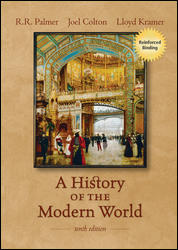
History of the Modern World, 10th Edition (Palmer)Chapter 26: The International Revold Against Soviet CommunismChapter OverviewAt the close of the twentieth century, the world was transformed by the collapse of communism. In the Soviet Union, Gorbachev’s reforms unleashed a crisis that led to the dissolution of the U.S.S.R. and its reconstitution as the Russian Federation under Yeltsin’s leadership. The new Russia faced economic troubles and separatist threats, especially in Chechnya. In eastern Europe, many countries made the transition peacefully. Poland’s Solidarity movement triumphed at the polls, the Hungarian Communist party took the lead in economic and political reforms, and East and West Germany were reunified. In Czechoslovakia and Bulgaria, massive demonstrations forced the government to resign. Other countries, however, were convulsed by violence and the renewed tensions of ethnic, religious, and nationalist differences. The breakup of Yugoslavia led to a war involving ethnic cleansing that was only resolved by international intervention. Across central and eastern Europe, the hardships entailed in making the transition to market economies brought a number of former Communist politicians into power, this time by way of elections. However, economies grew throughout the region, and pluralist political systems also flourished. |  |















